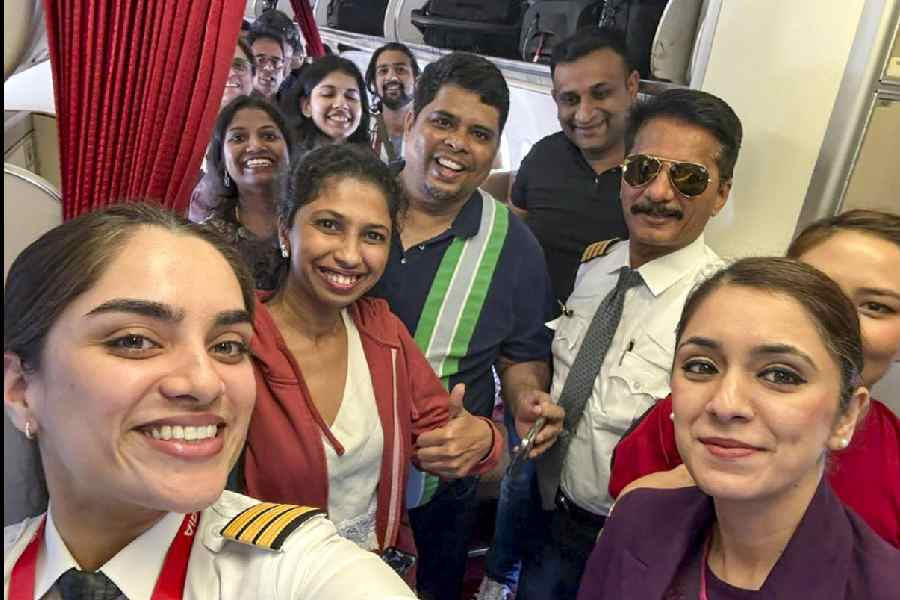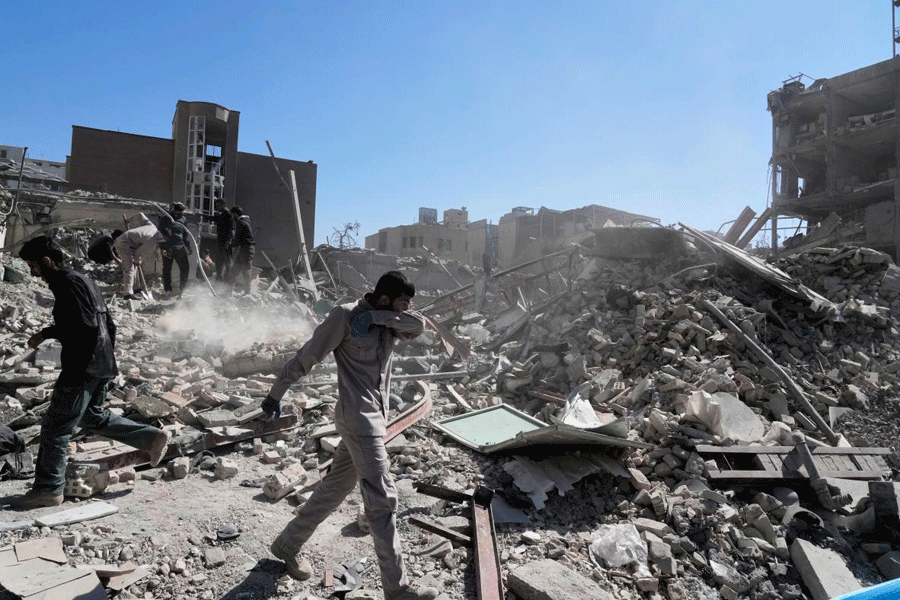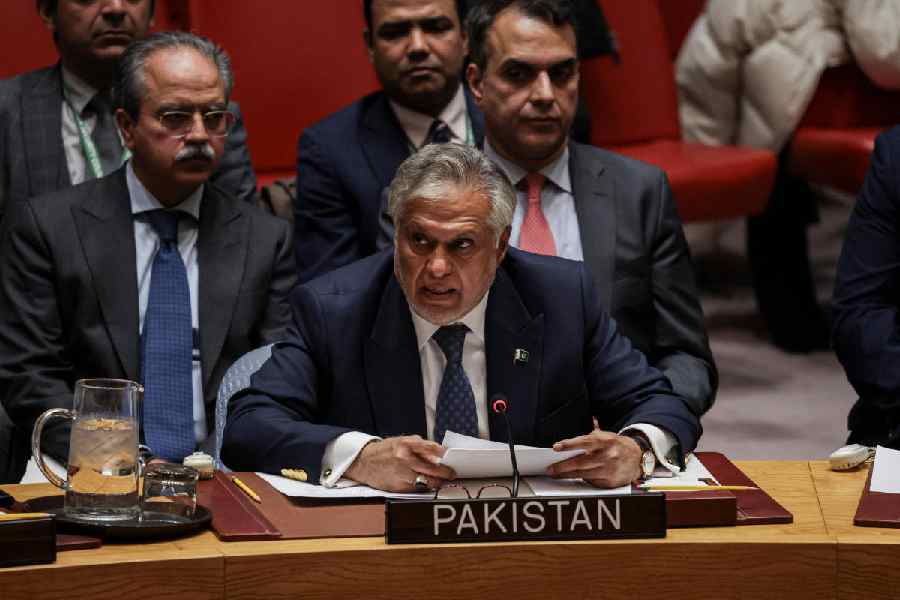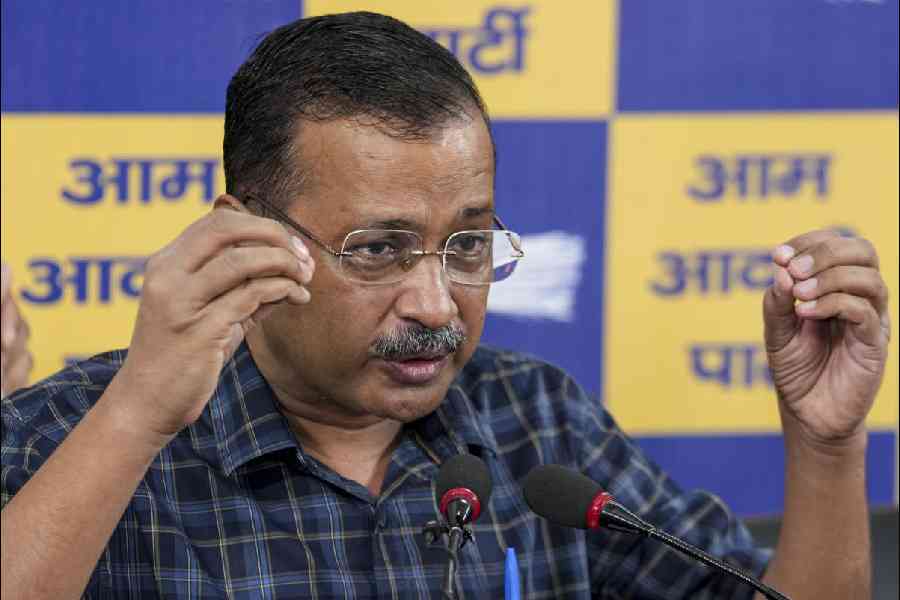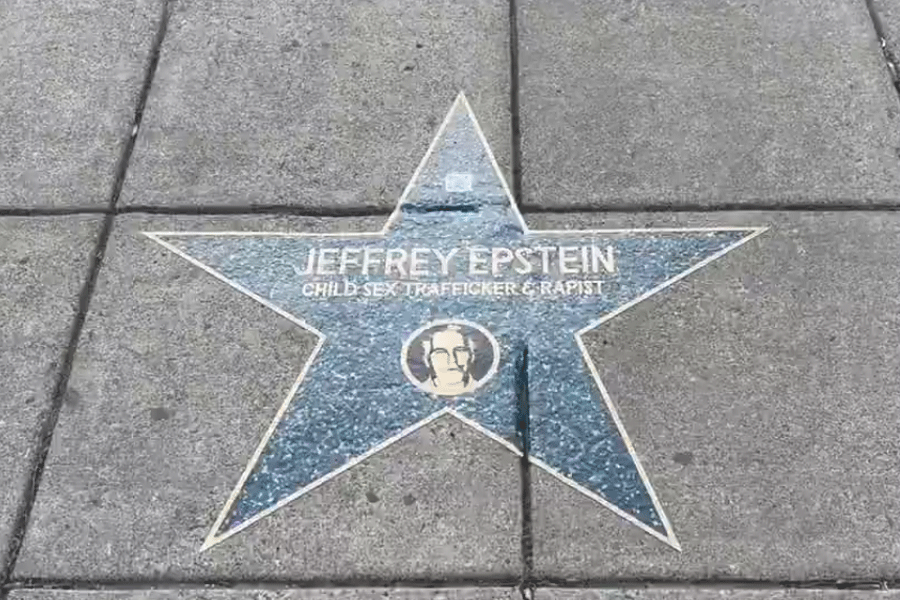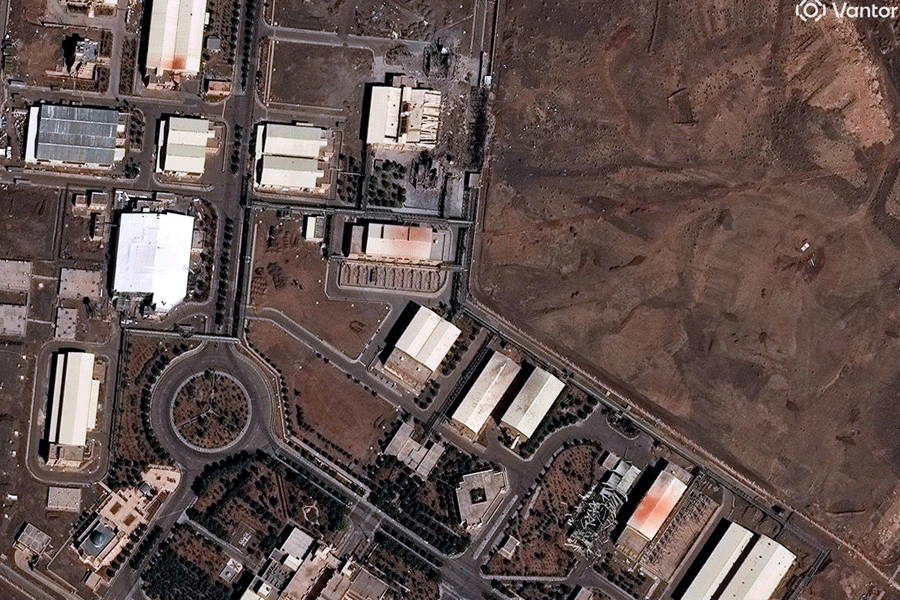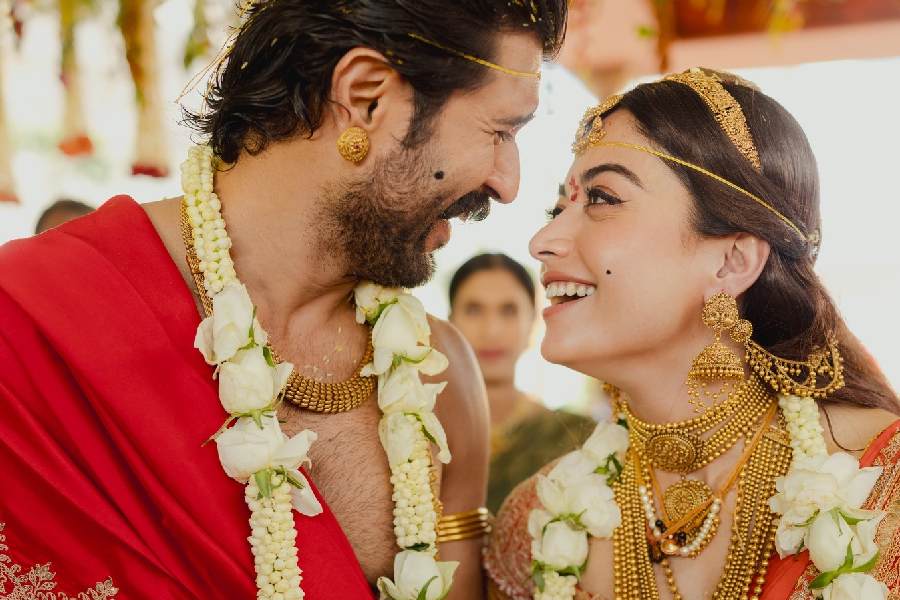It's no secret that the government strides the sports stage like a colossus. It doles out far more money to sports than any private organisation does or can. Sports federations continue be dominated by politicians. Yet the quality of official coaching often leaves something to be desired.
'The biggest problem for sports in India is the backroom support staff in coaching is third class,' says Viren Rasquinha, a former Indian hockey team captain who is now chief operating officer of Olympic Gold Quest (OGQ), a private body set up to help Indian sportspeople pursue their gold medal dreams. A leading athlete says privately that coaches are sometimes hired because they kowtow to sports federation functionaries.
Even so, the first stirrings of change are visible on the horizon. Private organisations such as OGQ are beginning to make a difference in a tiny way, though a transition to private dominance of sports remains years away, if ever.
-

SHOOTING STARS: Rahi Sarnobat (left) and Ayonika Paul
Flashback to May 5, 2014. Pistol shooter Rahi Jeevan Sarnobat fell and hurt her right hand, with which she shoots. She couldn't lift her hand, let alone hold her weapon. None of the doctors she consulted found a fracture.
Enter the Mumbai-based OGQ, which she'd joined in June. It brought Sarnobat down from Pune, where she was training, to a leading hand injury specialist in Mumbai. He ordered an MRI and the report arrived at 11pm — Sarnobat's hand had a fracture. 'We put her on a day-to-day, time bound, rehabilitation programme. There was rest, rehab, and endurance, strength and shooting training,' Rasquinha recalls.
Sarnobat stresses that she was surprised she could make it to the Commonwealth Games. 'But for OGQ, I would have been at home nursing my injury while others were in Glasgow,' she says.
She won a gold medal at the Games.
OGQ has stepped in to rescue other sportspeople too. Discus thrower Vikas Gowda hadn't won any medals at several international sports events and was ready to give up his quest. In 2009, OGQ signed him on, shifted him to the Athletics Performance Centre at Phoenix, Arizona, in the US. He trained there for five years, with OGQ picking up the annual tab of about Rs 15 lakh, taking the total bill to Rs 75 lakh.
During those five years, Gowda won a silver medal at the 2010 Commonwealth Games, a bronze at the 2012 Asian Games and a gold at the Glasgow Commonwealth Games.
Last fortnight, OGQ's board members and leading lights winged their way into the capital for a celebratory bash at a five-star hotel. The 250-strong gathering included the 15 athletes who had won medals at the Commonwealth Games whom OGQ had backed. 'It was a felicitation-cum-fundraising dinner,' explains Rasquinha.
OGQ has much to celebrate. Its budget — and spending on athletes — is up from Rs 1.4 crore in 2009, when it supported around 12 athletes, to Rs 6 crore this year (57 athletes). The goal is to eventually back 100 athletes, says Niraj Bajaj, a director and one of the promoters of the Bajaj group and board member of the Foundation for Promotion of Sports and Games, under which OGQ falls.
OGQ is making its presence felt. At the Commonwealth Games, it supported 20 athletes — of whom 15 won 16 medals. What's more, it backed four of India's six medalists at the London Olympics.
Of the 57 athletes in its stable, 43 are being groomed for the 2016 Olympics in Brazil; the remaining 14 are promising young athletes (11-18 years) OGQ is grooming.
Testifies shooter Ayonika Paul, who won a silver medal at the Commonwealth Games and is supported by OGQ, 'It's a very professional organisation which puts athletes before everything else. It has very dedicated people.'
The non-profit organisation works with athletes in badminton, boxing, athletics, archery, shooting and wrestling. Why these six sports? Quite simply, OGQ thinks that India has a good chance of winning Olympic medals in these areas. What if someone outside these fields, a swimmer, for instance, approached OGQ? Rasquihna replies that if it sees genuine potential in them, it will be open to them.
OGQ offers athletes a host of services that they'd otherwise find difficult to access — that extra edge that sometimes can make the difference between winning and losing, as OGQ functionaries put it. Explains billiards champion Geet Sethi who set up the foundation along with badminton player Prakash Padukone, 'We offer not just financial support. We offer technical support, medical support, injury intervention and logistics support. The best coaches are sourced from around the world for our athletes.'
Sethi adds that the 'seeds of the idea' were sown at the 1998 Bangkok Asian Games. 'For the first time, I was part of the Asian Games Indian contingent. I realised that our athletes were underprepared and that timely and professional support was unavailable to most of them. So I flew down to meet Prakash Padukone and we gelled on this initiative.'
Cut to 2009. Sethi and Padukone make a presentation on OGQ at the Bombay Gymkhana club. In the audience are Niraj Bajaj's wife Minal, and son Nirav. They later urge Bajaj to meet the duo.
-


Geet Sethi (left) and Niraj Bajaj
Bajaj has excellent sports credentials — a table tennis player when he was seven-and-a-half years old, a member of the Maharashtra state junior table tennis team when he was 11. By 13, he had captained the Indian school boys' team at the Asian school boys meet in Singapore. Two years later, he was all-India junior champion and then became the men's all-India champion more than once.
He would go on to become the youngest (at 17) sportsman to get an Arjuna award, would win medals at the Commonwealth Games and Asian Games, captain the Indian team and notch up India's only victory against China at Calcutta's Netaji Stadium at the World Championship.
Then, at the peak of his career, at 22, he would give it all up to pursue a business degree at Harvard University and join the family business.
Bajaj is a bit over 6 feet tall, an affable tycoon who recalls his table tennis days with pride. He'll be 60 in October. He doesn't play the game any longer, he says, except at home with his son Nirav.
Sethi and Padukone met Bajaj in his second floor office at Mumbai's Nariman Point. Bajaj was soon sold on the idea. 'I saw that this was a very dedicated team of world champions. I had the honour of captaining the Indian team and wanted to give something back to sports,' he told The Telegraph later.
Industrialist Rahul Bajaj's first cousin has thrown the weight of the Bajaj group behind OGQ, devoting time and energy to promoting the pursuit of medals for Indian athletes. The Bajaj group is not OGQ's only financial backer, though. Other big funders include Rakesh Jhunjhunwalla, the stock market billionaire, Shitin Desai, executive vice-chairman of DSP Merrill Lynch, Manish Sabde, a real estate developer in Pune, HDFC Asset Management Company and Housing Development Finance Corporation.
Before Bajaj came on board, Sethi and Padukone had met Shitin Desai at his office in Mumbai. Says Sethi, 'He was watching a cricket match on TV. In the five-minute presentation I made to him, he was so distracted by the cricket match that I thought he was not interested and that I was wasting his time and mine. Suddenly he looked at me in all concentration and asked, 'What's stopping you?' I said I needed funds. 'How much do you need and do you have an athlete you want to support,' he asked. At least Rs 25 lakh, I replied. Gagan Narang was the athlete, I added. He opened his cheque book, gave me a cheque for Rs 5 lakh and said he was making a commitment of Rs 25 lakh and that his cheque book would always be open to support Indian athletes.'
Desai had once had a long chat with a friend, N. Venkat Krishnan, currently the director of GiveIndia, on the absence of sports promotion in India except for cricket, and how he was ready to lend support to any initiative on this. 'I had read about a non-resident Indian promoting hockey in a district in Odisha that produced many international hockey players. I was really inspired by that. Venkat remembered that conversation and told Sethi about my interest in contributing to such a venture. We hit it off from the moment OGQ approached me,' Desai says.
Sethi's and Padukone's genuineness of purpose impressed him the most, Desai adds. 'Moreover having such legends at the helm meant that youngsters would look up to these people and get inspired,' he says.
Two days later, R. Ramaraj, senior advisor, Sequoia Capital, too committed another Rs 25 lakh, Sethi adds, 'and OGQ began its flight.'
Since then, OGQ has raised money every year. It makes presentations to companies and individuals. Says Sethi, 'We have presented the OGQ case all over India and even in California. We have talked to large corporations, small companies, to high net worth individuals, to sports lovers and social organisations.'
A recent presentation to HDFC group chairman Deepak Parekh netted in Rs 50 lakh. It holds fundraising dinners nationwide, paid for by one of OGQ's financial backers.
It has also resorted to seeking money from individuals on social media sites.
In one campaign, it raised Rs 10 lakh for foreign coaching and a new sledge for Shiva Kesavan, the first Indian to compete in luge (where the competitor races lying down on a sledge, face up) at the Winter Olympics this year.
In the second campaign, it sought to raise Rs 20 lakh for shooters Paul and Pooja Ghatkar, walker K.T. Irfan and discus thrower Gowda, who were participating in the Commonwealth Games, Asian Games and World Championships — but ended up raising Rs 16 lakh. Actor Amitabh Bachchan, who also contributed, wanted his money earmarked for the women athletes, says Rasquinha. Donors can claim a 50 per cent tax deduction on their donations.
Just how does OGQ function? It has tied up with Ethinos Digital Marketing for OGQ's online marketing, with Dr Lal PathLabs for blood tests for its athletes and Nike for apparel. Both Ethinos and Nike don't charge OGQ anything. Dr Lal PathLabs charges only for the blood test but not for sending technicians to athletes' locations.
Doctors who have conducted surgeries on OGQ's athletes have waived surgery fees, but OGQ has paid hospital charges. It also has full-time contracts with physiotherapists in some cities. 'We pay salaries to mental trainers and to six top physiotherapists,' says Rasquinha. 'When I first came here, I failed to understand why shooters would need a physiotherapist. But I realised that when you are shooting you stand straight for eight hours a day holding a 5kg rifle. All of them have back problems, shoulder problems, arm problems, stiff necks,' he adds.
'OGQ is doing a commendable job, but with limited resources,' says a government source. 'Sportspersons on the OGQ list are also constantly receiving government backing and the money involved there is, naturally, much more. In the end, when a sportsperson like (wrestler) Sushil Kumar wins a medal, it is not right to give all credit to OGQ. It does have a role, but the government plays a far bigger role in making Sushil Kumar or Gagan Narang world-level stars,' he adds.
Unquestionably, OGQ and its ilk are minnows in the Indian sporting world — the government is the whale here.
According to figures the ministry of youth affairs and sports provided to Parliament, the government spent Rs 225 crore in 2013-2014 on the federations, on organising coaching camps and holding sports events in the country. The three independent private sports organisations together won't be spending more than Rs 12 crore this year.
Scoffs Raj Singh, secretary general of the Wrestling Federation of India, which had a budget of Rs 14.29 crore last year, 'Take it from me. All these organisations put together will not spend Rs 14 crore on wrestlers even in the next 10 years. They may help a few wrestlers in managing injuries and getting some specialised coaching, but they can never match us.'
Singh also says that since most of these organisations are run by former sportsmen and 'MBA types', they understand the importance of publicity, unlike the sports federations or the government. 'They use the media very well.'
Randhir Singh, India's representative on the International Olympic Committee and secretary general of the Olympic Council of Asia, backs the point. He says, 'Organisations like OGQ play an important role, but 95 per cent of all funds come from the government of India. I don't see that changing in the future also.'
Still, Bajaj raises a fundamental matter when he says, 'Funding is important, but funding doesn't create world champions. If it did, we would have had many of them in the last 60 years.' Adds Rasquinha, 'The support we give athletes is over and above the support they get from the government.'
The government, he says, may bring together 100 shooters at a national shooting camp, with foreign coaches. 'But with 100 shooters, how can a coach give personal attention to them?' he asks.
Amidst this to-ing and fro-ing, a significant development escapes attention. From April 1, 2014, companies with a sales turnover of Rs 1,000 crore or more, with a net worth (equity plus reserves) of Rs 500 crore or more or a net profit of Rs 5 crore or more will have to earmark 2 per cent of their average net profit over the last three years for corporate social responsibility (CSR) spending — and spending on nationally recognised sports and Olympic sports now falls in the CSR ambit.
-


Cheer Factor: Vikas Gowda and (top) Viren Rasquinha
Quite simply, companies will have to fork out hefty sums. According to back of the envelope calculations by Parul Soni, executive director and leader, development advisory services, Ernst & Young, the consultancy firm, some 16,400 companies will have to shell out roughly Rs 22,000 crore. It is anyone's guess how much of this will come the way of private sports foundations. But if even one per cent of this does, the figure would be Rs 220 crore.
Will that tilt the balance a bit in favour of private sports foundations? That's an interesting poser to which no answers are coming as yet.
They also serve
Olympic Gold Quest (OGQ) is not the only private outfit in town to support sportsmen and sportswomen — GoSport Foundation in Bangalore, JSW Sports in Mumbai (which falls in a slightly different category) and the Pune-based Lakshya Trust do so too.
Most sports promotion bodies exhibit common traits.
For one, they usually operate out of modest offices. OGQ's Viren Rasquinha and his six-member team function from a tiny office space in Mumbai's central business district. They work around a conference table that's adorned by a few laptops. GoSports Foundation, set up in 2008 by lawyer Nandan Kamath, former tennis player Abishek Laxminarayan and property development company managing director Thomas Ollapally, has its office on the first floor of a bungalow in a Bangalore residential colony. Its four employees share the floor with the staff of two other Kamath firms. Lakshya has three rooms in an office complex and four employees, including two player managers.
Secondly, young teams run these operations. At OGQ, Rasquinha is 33; the others are in their 20s. At GoSports, the average of its three employees is 30.
Thirdly, almost all raise funds from individuals and companies, and from activities. Says Sunder Iyer, founder-secretary of Lakshya, 'We were asking for funds from the public long before OGQ.'
GoSports raises 60 per cent of its money from individuals; only 40 per cent comes from companies, says Nandan Kamath. In contrast, OGQ gets less than 10 per cent of its money from social media sites (read: individuals). Also, GoSports seeks donations from participants in marathons and runs, the auctioning of memorabilia signed by the world's best athletes and holds charity dinners. Charity dinners are big with OGQ too.
JSW Sports, however, is the odd man out here. Like other corporate sports foundations, it gets its cash from its parent company. And it marks its difference from the others in another respect. JSW Sports is to put up a high performance centre at Bellary in Karnataka to train about 300 athletes. 'This will set us apart and provide opportunities to many more athletes,' says JSW Sports CEO Mustafa Ghouse.
Still, the big beast of this small world clearly is OGQ (see figures on Page 11). OGQ focuses on established athletes, though it has a young (11-18) athletes training programme too. Notes Kamath, 'While our objectives are similar, our approach has been to deal primarily with junior athletes as they transition to senior status. OGQ's primary focus has been on athletes of elite status. The work is complementary.'
So OGQ has in its stable M.C. Mary Kom (boxing), Sushil Kumar and Yogeshwar Dutt (wrestling), Rahi Sarnobat, Gagan Narang and Vijay Kumar (shooting), Saina Nehwal, P. Kashyap and P.V. Sindhu (badminton) and Vikas Gowda (discus throwing). GoSports has H.S. Prannoy and Sourabh Verma (badminton) and Chikkarangappa S. (golf) among others. Lakshya has Pooja Rani and Pinky Jangra (boxing), and Vidit Gujrathi and Soumya Swaminathan (badminton). JSW Sports has Amit Kumar, Bajrang and Babita Kumari (wrestling), Shushila Devi (judo) and Siddhanth Thingalaya (athletics).
Amidst all this cheer, there's some gloomy news. Steel billionaire Lakshmi Mittal's Mittal Champions Trust (MCT), which ran for nine years from 2005, has shut. Says Manisha Malhotra, former CEO, MCT, 'The trust had to be wound up because the Mittals were scaling down their industrial activity in India.' The former Indian women's tennis player adds that MCT spent $10 million (about Rs 60.45 crore) on training and promoting sports people.
In the years to come, however, sports promotion concerns are more likely to mushroom than close. The government recently included rural sports, nationally recognised sports and Olympic sports among permissible corporate social responsibility activities. 'I foresee more and more corporations coming up with foundations that have the promotion of sports as one of their key objectives,' says Parul Soni, executive director and leader, development and advisory services, Ernst & Young.
Let a thousand flowers bloom, we say.







